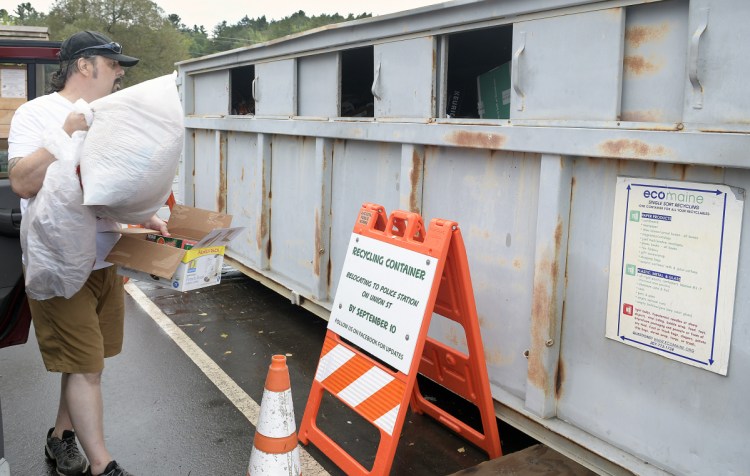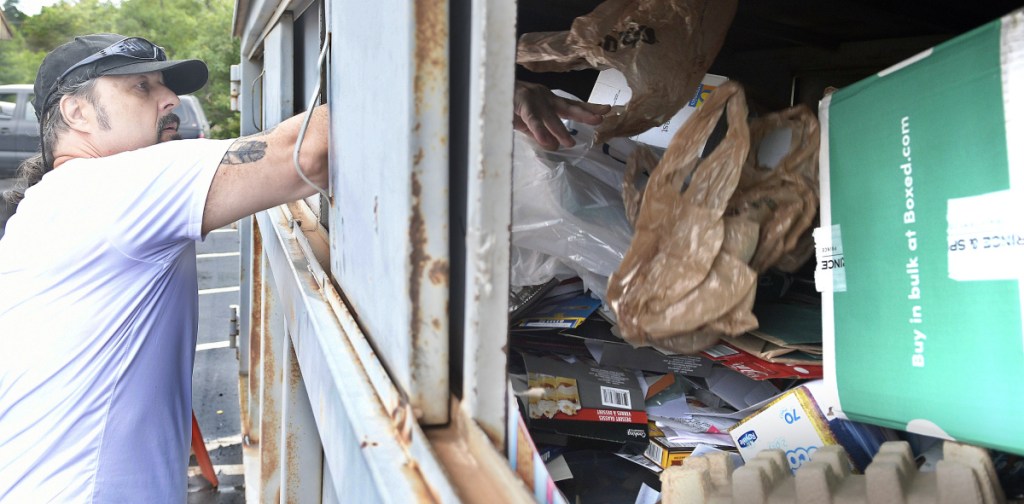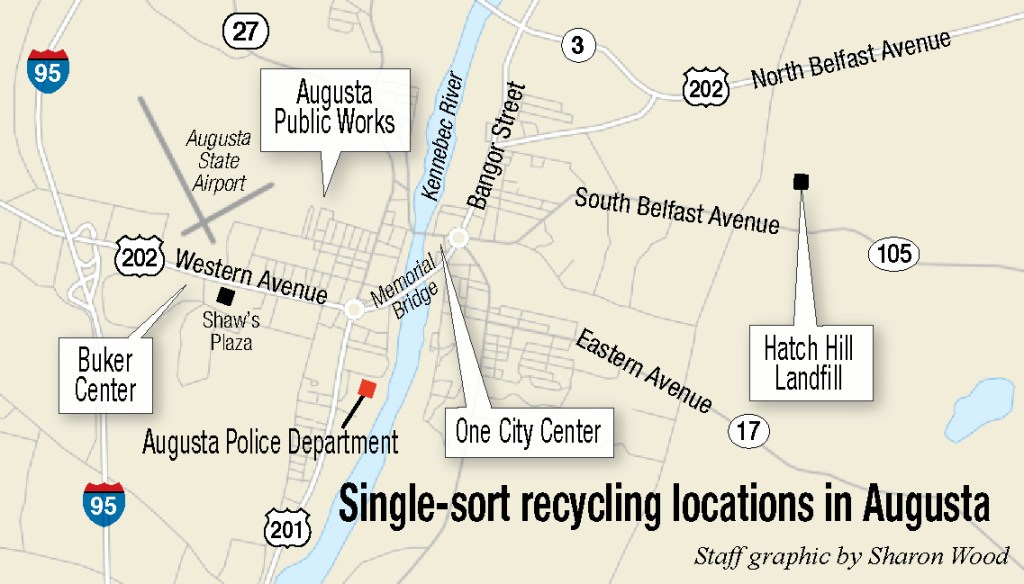AUGUSTA — Too many non-recyclables are going into recycling containers.
That is prompting changes in Manchester and Augusta in the coming days and months. Manchester is planning to end its single-sort recycling program at the end of the year, while Augusta is moving one of its collection containers to a more visible location.
Contamination by items that aren’t recyclable but are nonetheless still tossed into single-sort recycling roll-off containers by some people is costing local municipalities money. Recycling firms, in response to changes and a glut of recyclable paper in the international recyclables market, have clamped down on contaminated loads sent to them for processing, charging fees for loads which contain too many non-recyclable items.
Some loads of recyclables from Manchester have been made up of more than 20 percent non-recyclable items, including household trash, plastic bags and food. Over a three-month period this summer, that cost the town about $1,100 in contamination fees charged by ecomaine, a nonprofit company owned by a group of Maine municipalities that runs a recycling sorting facility in Portland.
Garry Hinkley, chairman of the Manchester Conservation Commission, said some people may simply be mistakenly pitching plastic bags, containing otherwise recyclable items, into the bin. Plastic bags are not recyclable. However he said, based upon what has been found both in Manchester and the bins hauled to ecomaine, it is clear some people are intentionally throwing non-recyclable garbage into the containers, rather than disposing of it properly.
“You get a couple of (bags of garbage) and the whole load is gone,” Hinkley said. “There’s really no excuse for that now.”
Manchester allows residents to put their recyclables in a “silver bullet” roll-off container kept outside the town office. Until the contamination fees started, the town’s only cost of the single-sort recycling program, in which users don’t have to separate various kinds of recyclables from each other, was the cost of transporting the container to and from ecomaine to be dumped. That cost is $175 per trip, typically twice a week.
Town officials said the additional cost of contamination fees, if nothing changes, would make the program unsustainable.
Town Manager E. Patrick Gilbert said Manchester’s single-sort recycling program has been popular with residents, as it takes a wider variety of items than the previous recycling system available to residents. It also doesn’t require recyclable items like cardboard, glass and paper to be sorted from each other.
The town is approaching the end of its five-year contract to send its recyclables, at no charge other than the cost of transporting the bins to Portland and back, with ecomaine.
“It had been a great four-and-a-half years, then all of a sudden we started getting these contamination fees,” Gilbert said. “At the rate we’re going, we’ll run out of money (for recycling) by January.”
So the town alerted ecomaine it plans to not renew its contract when it expires at the end of the year. Gilbert said when the town contacted the company, it was told ecomaine was not renewing its contracts with municipalities that sent recyclables to its facility at no charge, Manchester among them.
Matt Grondin, ecomaine communications manager, said the company is exploring new contracts with its users which have contracts allowing them to bring recyclables there at no charge. He said that is still being worked out, but a tipping fee could be part of the proposed new agreements.
Tom Oliver, chairman of the selectmen in Manchester, said recycling will be a topic of Tuesday’s selectmen’s meeting. He’s hopeful the town will have some recycling option for residents by the end of the year when the deal with ecomaine runs out and Manchester’s recycling bin is hauled off for the final time.
“I’m not saying it’s going to be an easy solution — it’s not,” Oliver said.
Grondin said ecomaine’s business team has been in contact with Manchester officials and they hope to strike a new, alternative deal to keep recyclables coming from the town to ecomaine.
“We’re in close touch with folks in Manchester and want to work it out, we hope recycling can continue there,” he said. “What it is and when that would be remains to be seen.”
MAKING A MOVE
Augusta has collection bins where residents can drop off their unsorted recyclables at Hatch Hill landfill, John Charest Public Works Facility, Augusta City Center, and Buker Community Center. Contamination has also been a problem for the city, though most of its loads taken to ecomaine haven’t reached the 20 percent level Manchester has seen.
But the two collection sites that aren’t monitored by city employees — and are accessible 24 hours a day, seven days a week, at City Center and Buker — have consistently had contamination rates well above 5.9 percent, the percentage above which ecomaine starts charging fees.
In response, the city plans to move the bin at Buker to a parking lot adjacent to the police department off Union Street, in hopes its proximity to law enforcement will deter people from dropping non-recyclables into the recycling bin.
Public Works Director Lesley Jones said Augusta’s contamination rates have improved as city, and ecomaine workers have tried to spread the word to users about what can and can’t go into the bins. About one of every five containers the city sends to ecomaine have more than the accepted amount of non-recyclables in them and thus cost the city a fee, which ranges from $35 per ton for loads with 6- to 10-percent contamination, up to $65 per ton for loads with 26 percent or higher. She estimated the fees will cost the city about $2,400 during the year.
Jones is doubtful the amount of non-recyclables left in the unmonitored bins will ever be brought down low enough to avoid the city having to pay fees for contamination. She said the city may eventually have to eliminate the two unmonitored bin locations, leaving only the bins at Hatch Hill and the public works garage, which are only accessible during the day.
“We’ll never get there with the unsupervised drop-offs,” Jones said. “All it takes is one person, with a load of stuff they don’t know what to do with.
“Quite frankly I think probably 80 percent of the people are doing a good job. But you’ve got that outlier group, that doesn’t understand or just wants to get rid of something and doesn’t care how,” she added. “We’ll see how much it helps to relocate (the container now at Buker) to the police department. But, potentially, we could have to pull (the unmonitored bins) so we have them only at locations where we can monitor them pretty closely.”
THE CHANGING MARKET
Ecomaine officials said the company had to clamp down on contaminants after China, which was once the major market for recyclable paper, stopped accepting recyclables last fall from companies in the United States. There is also a glut of recyclable materials on the market, driving down demand.
Matt Grondin, ecomaine communications manager, said China remains out of the market, which has imposed challenges on the entire industry.
The company is paying to get rid of paper because it can’t find anyone to buy it. Grondin said the market is showing some improvement, however, as ecomaine is paying less to get rid of paper than it had been previously.
In response to the market changes, ecomaine began enforcing limits on contaminates coming from its customers. It also added staff, increasing the number of hand-sorters on the recycling line by half, thus increasing its processing costs.
On what Grondin said are fairly rare instances, some bins brought to ecomaine are so contaminated with non-recyclable items, it sends them to its waste-to-energy incinerator so the items can be burned, instead of sorting through the items.
The company also has two full-time educators who go into schools, retirement communities and to town events to spread the word about what items can and can’t be recycled.
Both Augusta and Manchester also had people monitor the containers to prevent users from dumping in non-recyclables. But officials of both towns said it would be too costly to monitor the containers around the clock.
Grondin said the most common contaminant ecomaine sees is plastic film and plastic bags, in large part from people putting their recyclables into plastic bags and pitching those into containers. Not only are plastic bags not recyclable, they also tend to get wrapped around the machinery the company uses to sort recyclables. And that costs time and money when the machinery has to be stopped to remove plastic bags.
Items that don’t belong in the single-sort recycling mix found in containers in Augusta have included video monitors, a pedestal fan, and 200 pounds of wood scraps and metal.
Other local municipalities that use ecomaine for recycling processing, according to Grondin, include Chelsea, Readfield, Fayette, Wayne and Monmouth.
Augusta has a five-year contract with ecomaine that runs until 2020. Recycling makes up a relatively small portion of what is thrown away in Augusta. In 2017, about 375 tons were recycled in Augusta, compared to about 33,000 tons of waste that goes to Hatch Hill landfill in a typical year.
In the meantime, Manchester residents, like those of the other seven member municipalities that have agreements to allow residents from those municipalities to bring their garbage and recyclables Augusta’s Hatch Hill landfill, can drop their recyclables in the single-sort container there.
Keith Edwards — 621-5647
Send questions/comments to the editors.






Success. Please wait for the page to reload. If the page does not reload within 5 seconds, please refresh the page.
Enter your email and password to access comments.
Hi, to comment on stories you must . This profile is in addition to your subscription and website login.
Already have a commenting profile? .
Invalid username/password.
Please check your email to confirm and complete your registration.
Only subscribers are eligible to post comments. Please subscribe or login first for digital access. Here’s why.
Use the form below to reset your password. When you've submitted your account email, we will send an email with a reset code.